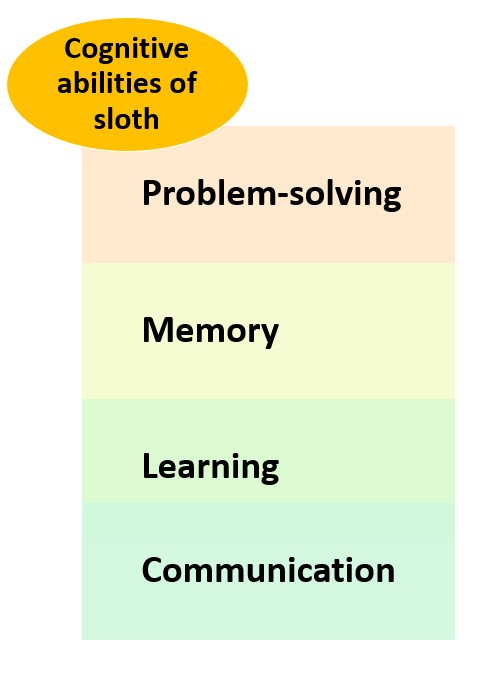
Image Credit: Sloth in Amazon,Wikimedia Commons, CC By 2.0
Sloths – they seem so languid! But are they really as slow-witted as they appear? Let’s explore these fascinating creatures and uncover what’s beneath their intelligence.
They reside in Central and South American rainforests, where they hang upside down from tree branches. This unique lifestyle allows them to conserve energy by moving slowly and having a low-calorie diet. They can even go weeks without eating, thanks to their special digestive system!
But sloths have more talents than just conserving energy. Scientists have discovered that they have an impressive memory for spatial orientation and can navigate the complex forest canopies with ease.
Take Edward for example – a baby two-toed sloth found abandoned in Panama. Despite having no parental guidance, he managed to quickly learn and master the art of tree-dwelling. This story shows the potential and intelligence of sloths.
It’s clear that sloths are far from being slow-witted. They demonstrate that intelligence can come in all shapes and speeds.
Key Takeaways
- Sloths may not be traditionally considered “smart” animals, but they have unique adaptations that allow them to survive in their environment.
- Sloths have a slow metabolism and spend most of their time hanging upside down in trees, conserving energy.
- Despite their slow movements, sloths are excellent swimmers and can move quickly when necessary.
- Sloths have a specialized digestive system that allows them to efficiently process their leafy diet.
- Sloths have a low body temperature and a slow heart rate, which helps them conserve energy.
- While sloths may not possess high intelligence, they have developed strategies to avoid predators and survive in their habitat.
- Sloths have a symbiotic relationship with algae and moths, which provide camouflage and protection.
- The unique adaptations of sloths make them well-suited for their arboreal lifestyle, even if they may not exhibit traditional signs of intelligence.
Intelligence of Sloths
Sloths are often underestimated for their intelligence, but they showcase some unique qualities that make them quite clever creatures. They can adapt and survive in their environment, with their slow movements actually helping them conserve energy and remain camouflaged from predators. Plus, their keen sense of smell allows them to locate food sources high up in trees.
Moreover, sloths have a specialized digestive system that efficiently breaks down tough leaves. This enables them to get all the nutrients from their diet. Despite their sluggish looks, they can be surprisingly strong and agile when needed. They are skilled climbers and can navigate through dense trees.
Additionally, sloths can stay motionless for hours, which helps them evade predators and makes them difficult to spot. Furthermore, they have an extremely slow metabolism compared to other mammals, allowing them to conserve energy and survive on a low-calorie diet.
An interesting story highlights the cleverness of sloths: a researcher observed one using its own fur as camouflage while crossing open ground. It covered itself with debris from the forest floor, disguising itself as a pile of leaves. This behavior showed excellent problem-solving skills and that sloths can adapt to their environment in creative ways.
Unique Adaptations of Sloths
Sloths have some remarkable features that help them survive in their environment. They have a slow metabolic rate, hook-like claws for gripping tree branches, strong muscles for moving, a camouflaging coat of fur, curved spines for comfort when upside down, and a flexible neck with a 270-degree range of motion.
Apart from these adaptations, sloths also rotate their legs externally by 180 degrees. This allows them to hang in any direction without effort. Plus, their long arms help conserve energy when moving through the trees.
These features have been shaped by natural selection over millions of years. Sloths have adapted to arboreal life, finding success in their habitat. However, their cognitive abilities are slow.
Cognitive Abilities of Sloths

Sloths. What slow-moving creatures of the animal kingdom! They possess various cognitive abilities that many overlook. Let’s uncover these intriguing aspects!
To discover the cognitive abilities of sloths, let’s take a look at this table of unique traits. Here’s a peek into the world of sloth cognition:
| Ability | Description |
|---|---|
| Problem-solving | Sloths demonstrate impressive problem-solving skills |
| Memory | They possess great long-term memory capabilities |
| Learning | Sloths have the capacity to learn and adapt to their environment |
| Communication | They use distinct vocalizations for communication |
Plus, sloths have other interesting qualities. For instance, they have evolved to blend into their surroundings, which increases their chance of survival. Also, their slow-moving nature helps conserve energy and avoid predators.
In order to help sloths maximize their potential, we must provide them with an enriched environment. This could include interesting structures for climbing or tasks that challenge their problem-solving skills.
Additionally, positive reinforcement techniques during training sessions can enhance their learning capacity. By rewarding desired behaviors with treats or incentives, they are more likely to retain information and apply it efficiently.
Social Behavior of Sloths

Sloths prefer to live a solitary life, conserving energy and avoiding conflict. Despite their secluded nature, sloths still engage in limited social interactions, such as mating and raising offspring. Females emit distinct vocalizations to attract males during breeding season, and they may even partake in ‘sloths’ embrace’, intertwining limbs in a peaceful manner.
These mild social tendencies prove that sloths are more than mere loners; they are mysterious, captivating creatures with intriguing social behavior. To witness sloths in their natural habitat, visit regions like Costa Rica or Panama – just remember to keep your distance!
Sloths opt for keeping to themselves, saving energy and dodging any drama. However, they aren’t strangers to socializing – mating and caring for young, ladies emitting vocalizations to woo dudes, and even ‘sloths’ embrace’ where they peacefully link up limbs!
Despite their reclusive reputations, these peculiar critters possess quite the charming social behavior. So, if you wanna witness sloths in action, take a trip to Costa Rica or Panama – but remember to stay back and let them do their thing!
Frequently Asked Questions
1. Are sloths smart?
While sloths have a reputation for being slow and lazy, they possess a unique intelligence suited to their environment. They may not demonstrate conventional smartness, but they have adapted remarkably to their habitat.
2. How do sloths survive in the wild if they are not smart?
Sloths have evolved unique survival strategies to compensate for their perceived lack of intelligence. They rely on their slow movement and camouflage, blending perfectly with their surroundings to avoid predators. Their slow metabolism and low-energy diet also help them conserve energy in their tree-dwelling lifestyle.
3. Can sloths learn and remember things?
Yes, sloths can learn and remember things within their own limited scope. They have the ability to recognize their home range and remember the locations of food sources, which are crucial for their survival.
4. Do sloths possess problem-solving skills?
Although sloths may not exhibit problem-solving skills like some other animals, they are quite efficient in finding solutions within their specific needs. Their slow, cautious approach allows them to navigate their environment and find resources without expending unnecessary energy.
5. Are sloths capable of communicating?
While sloths may not communicate in the same way humans do, they have certain social behaviors and vocalizations to convey messages to other sloths. They may use a series of high-pitched calls, scent marking, and body language to communicate with their fellow sloths.
6. Can sloths be trained or domesticated?
Due to their unique biology and nature, sloths are not suitable for traditional training or domestication. They are wild animals best suited to their natural habitat and do not possess the traits necessary for domestication like dogs or cats.
Conclusion
Exploring sloth intelligence leads us to an intriguing conclusion. Though slow-moving, these remarkable creatures show surprising wisdom. Investigating further reveals extraordinary details.
Sloths may look simple, but beneath the surface lies a realm of complexity. They’ve adapted to their environment in remarkable ways, conserving energy and thriving in the treetops. Problem-solving skills and impressive memory reveal advanced cognitive abilities.
With this knowledge, we may uncover new perspectives on intelligence within our natural world.
